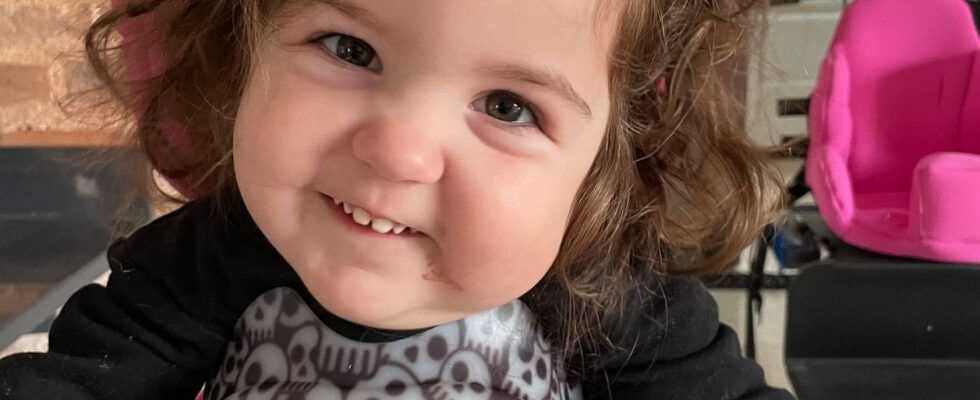Since Elisa's birth, her parents have lived to the rhythm of consultations with specialists. In June 2019, the little family could see a glow at the end of the tunnel when their daughter received gene therapy treatment, the research of which was funded by donations from the Telethon. Testimony.
“Elisa, our first child, was born in September 2018. Following esophageal atresia (which has nothing to do with the disease), she underwent surgery at birth. Very quickly, she began to contract several bronchiolitis and continued hospitalizations. At the age of 4-5 months, we realized that she had some delay in motor skills, “probably due to all of her hospitalizations,” doctors said. Worried, we decided all the same to contact our physiotherapist, with whom she began motor physiotherapy sessions, twice a week at first. After a month, the specialist informs us that something is wrong and Elisa should progress faster.
The physiotherapist is the first to give the alert and contacts the pediatrician, so that we can perform genetic tests. The diagnosis is made: our daughter, 8 months old at the time, suffers from spinal atrophy, a rare genetic disease which affects the nerve cells in charge of the muscles, the motor neurons. After telling us the news, the pediatrician referred us to a pediatric neurologist, through whom we learned about the characteristics of this disease, as well as the possibilities of treatment.
A whole new treatment
For this disease, two treatments exist. One by lumbar puncture, the other by injection of a synthetic gene that corrects the genetic defect directly into the patient's body. These genes are "carried" by a small, harmless virus. We had fifteen days of reflection to determine which treatment we wanted to choose for Elisa and finally opted for the second solution.
The clinical trials for this treatment had ended a fortnight earlier, so an ATU (single temporary authorization) had to be launched, a necessary step when a treatment has just arrived on the market. It was very long, because we were the first! Those who passed behind us were able to benefit from a shorter waiting time. The very high cost of treatment is also a factor that slowed down the implementation. We are lucky to be in France because, apart from hospitalizations, everything has been covered by Social Security.
Elisa was injected on June 21, 2019 by intravenous injection at the Toulouse Children's Hospital, where we are being followed. Thanks to this injection, the disease could be stopped in its progression.
Results already visible
Only twenty-four hours after the injection, we could see the first progress. Elisa managed to lift her head, something she could no longer do, and lift her arm the next day. Since spinal muscular atrophy is a regressive disease, she held her head when she was little, but was unable to do so afterwards, as did moving her arms and legs.
Today, she can sit up, grab her feet to put them in her mouth, push on her legs when put on a small MOTILO (a device that helps with walking) and put more strength in her voice . With a cold, it also begins to cough, which is very important because 80% of children with this disease die from respiratory problems. A simple cold can escalate and lead to death. Without treatment, Elisa had a life expectancy of two years.
We don't have enough perspective on this new treatment, and doctors can't comment on what happens next. We are content with Elisa’s daily progress and will see where that takes us.
Fighting illness when you're a child …
Listening to your parenting instinct
As parents, we have the ability to sense when our child has a problem. Also, even when the doctors say everything is fine, we have to insist because only we can tell if something is wrong. When the diagnosis falls, you take a train in the face, that's for sure, but you still have to keep fighting. Thanks to Telethon donations that have enabled research to advance gene therapy, this is a light at the end of the tunnel for us. Daily life remains difficult, there is no doubt about it, but besides that, these children have so much love to give …
Regarding the disease our daughter suffers from, I think there is still a lack of prevention and screening. It is important that parents have their child screened at birth because the earlier it is detected, the less damage. We unfortunately didn't know this when she was born. Elisa is now 26 months old and has never been able to walk. Even so, we do not give up hope that she can one day make it happen. "
The Telethon, an initiative in the service of research
Organized since 1987 by the French Association against Myopathies (AFM), the Telethon collects tens of millions of euros each year for research into genetic diseases. In a 30-hour televised marathon where several personalities take turns animating, viewers attend performances and are encouraged to donate.
Since its creation, many actors, singers, comedians and sports champions have been sponsors of the show, such as Yannick Noah, Garou, Gad Elmaleh, Jane Birkin, Gérard Jugnot, Patrick Bruel… Matt Pokora is the sponsor of the 2020 edition which will take place on December 4 and 5.
To make a donation by telephone: call 3637 or online on the Telethon website.
